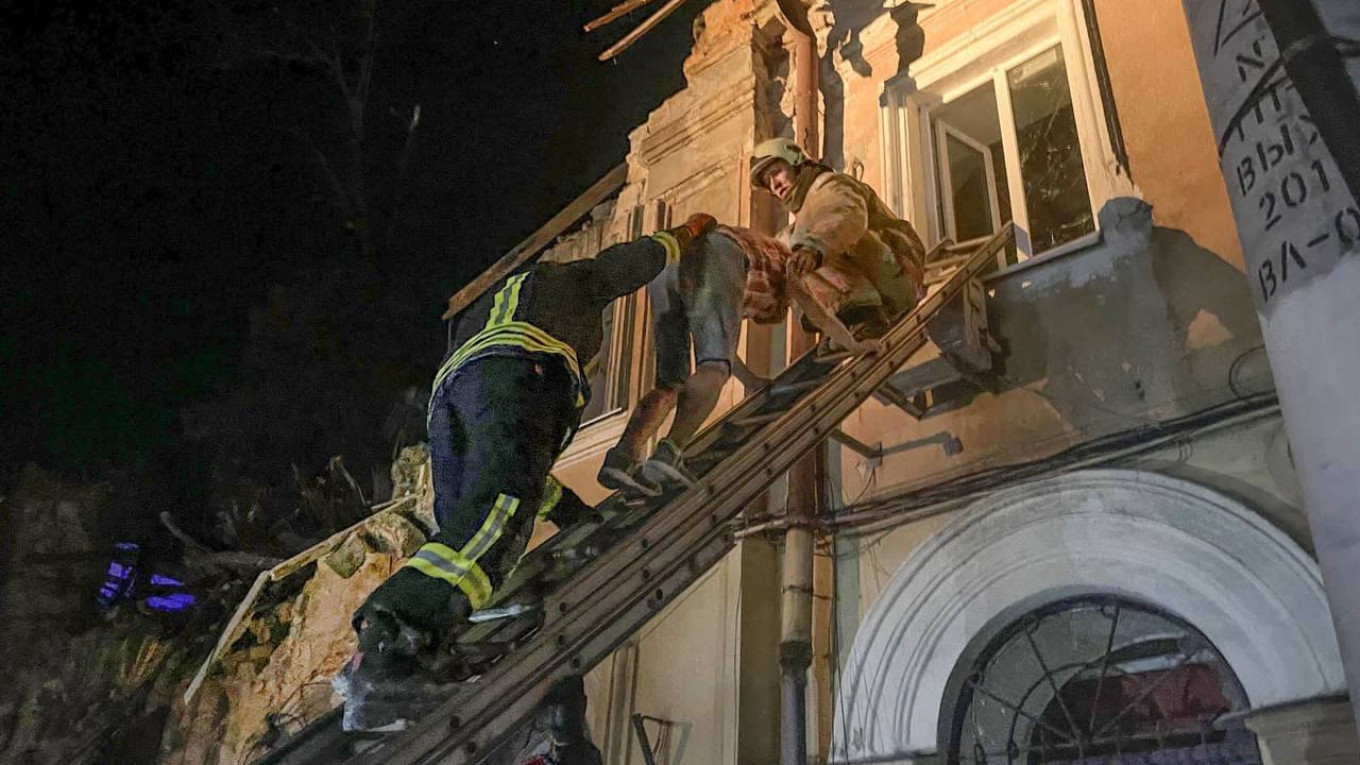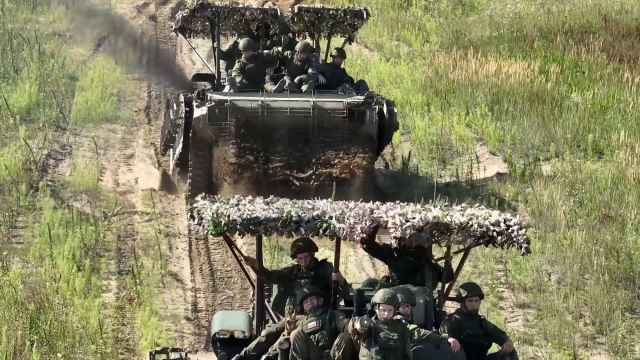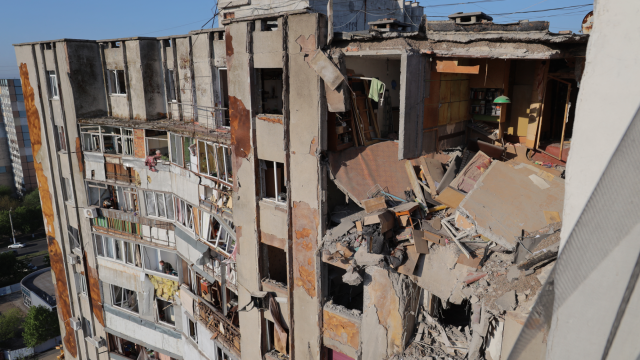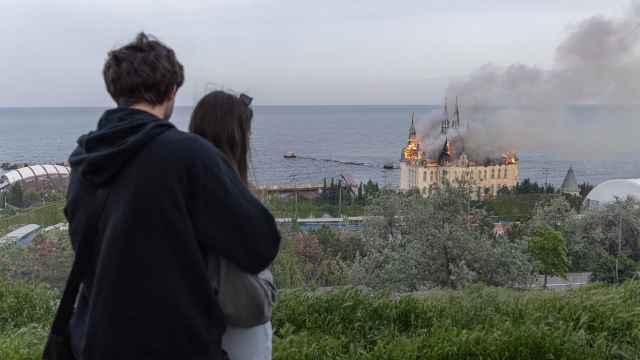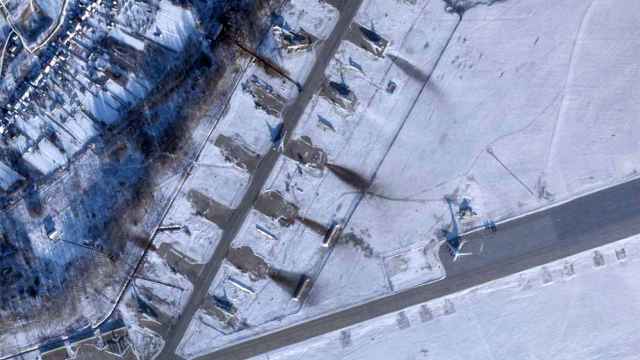Russia's latest strike on Odesa on Sunday killed two people and severely damaged a historic Orthodox cathedral, drawing a vow of retaliation from Ukraine's leader.
The 18th-century Transfiguration Cathedral, the biggest Orthodox church in Odesa, lies within the UNESCO-protected historic city center.
The strike on the port city, which Russia has pounded since quitting the Black Sea grain deal last week, came just hours before Russian President Vladimir Putin met his Belarus counterpart for talks.
Putin claimed Kyiv's counteroffensive had "failed" as he met his closest ally, Belarus leader Alexander Lukashenko, in St. Petersburg — the first time since Minsk helped end a revolt by Russian Wagner fighters.
On the Black Sea in Odesa, locals looked in disbelief as the Transfiguration Cathedral — originally built in 1794 under imperial Russian rule — was badly damaged.
Clergymen rescued icons from rubble inside the badly damaged shrine, which was demolished under Stalin in 1936 and rebuilt in the 1990s after the collapse of the Soviet Union.
Ukraine said it had been "destroyed twice: by Stalin and Putin."
It said the cathedral strike was a "war crime."
President Volodymyr Zelensky vowed retaliation: "They will definitely feel this," he said.
Images showed smashed mosaics on the cathedral floor as workers cleared the rubble. The outside of the building appeared intact.
"There was a direct hit to the cathedral, it completely damaged three altars," Father Myroslav, the assistant rector of the cathedral said.
He said icons were pulled out from under the rubble and that the shrine is "very badly damaged inside," with "only the bell tower intact."
Clergymen said a security guard and a priest readying for a morning liturgy were inside during the attack but both survived.
Russia blamed the cathedral damage on Ukrainian air defense.
Moscow said it had hit all its intended targets in the Odesa strike, claiming the sites were being used to prepare "terrorist acts" against Russia.
But on the ground, locals said Russia had hit ordinary residential areas.
'Just simple beauty salons'
"We have ordinary residential buildings here, where people live," a woman who owns a beauty salon nearby, Tetiana, told AFP.
"There are no military facilities here. Just simple beauty salons, a marine agency, a groomer. Nothing military here at all."
Anzhelika Domanska said she ran with her neighbours when she saw the cathedral burning.
The strike came a year after a missile had hit her house in nearby Mykolaiv.
"It is not a pleasant anniversary," she said.
Russia launched a wave of attacks on the Black Sea port this week, after exiting a deal allowing the safe passage of cargo ships between Moscow, Kyiv, Istanbul and the UN.
Ukraine has vowed to find a way to continue exports from the ports and said Sunday repeated Russian strikes on Odesa this week were an attempt to "prevent and neutralize international efforts to restore the functioning of the "grain corridor."
Putin meets Lukashenko
As Odesa cleared rubble from the Russian strikes, Putin hosted his ally Lukashenko in his native city of St. Petersburg, claiming that the Ukrainian counteroffensive to take back land captured by Russia had failed.
"There is no counteroffensive," Lukashenko said at the meeting, before being interrupted by Putin:
"There is one, but it has failed."
The Belarus strongman now hosts Wagner fighters on his territory, after brokering a deal that convinced its leader Yevgeny Prigozhin to end a march on Moscow and exile himself to Belarus.
Kronstadt walk
"They are asking to go West, ask me for permission... to go on a trip to Warsaw, to Rzeszow," Lukashenko said, referring to Wagner fighters, to Putin, who smiled. "But of course, I am keeping them in central Belarus, like we agreed."
"We are controlling what is happening (with Wagner)," he said, thanking Putin for vowing to defend Belarus should it be attacked.
The comments came two days after Putin said western Poland was a "gift" from Stalin at the end of World War II, when victorious allies decided on the contours of post-war Europe. Warsaw had summoned the Russian ambassador over the remarks.
After their talks, Putin and Lukashenko greeted crowds in the naval town and base of Kronstadt on Kotlin Island in a rare walkabout.
Russia's Kommersant newspaper posted a video of Putin and Lukashenko posing for photographs with people, with bodyguards standing nearby.
Asked about quarantine rules which the Russian leader has been keeping up strictly since the pandemic, Putin replied: "People are more important than quarantine."
Several days after Wagner had ended its mutiny last month, Putin met with adoring crowds in Dagestan in an apparent show of popularity.
A Message from The Moscow Times:
Dear readers,
We are facing unprecedented challenges. Russia's Prosecutor General's Office has designated The Moscow Times as an "undesirable" organization, criminalizing our work and putting our staff at risk of prosecution. This follows our earlier unjust labeling as a "foreign agent."
These actions are direct attempts to silence independent journalism in Russia. The authorities claim our work "discredits the decisions of the Russian leadership." We see things differently: we strive to provide accurate, unbiased reporting on Russia.
We, the journalists of The Moscow Times, refuse to be silenced. But to continue our work, we need your help.
Your support, no matter how small, makes a world of difference. If you can, please support us monthly starting from just $2. It's quick to set up, and every contribution makes a significant impact.
By supporting The Moscow Times, you're defending open, independent journalism in the face of repression. Thank you for standing with us.
Remind me later.


